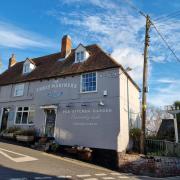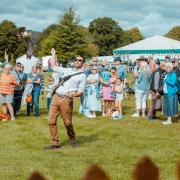From family gossip and true tales to favourite books and even sex, Kent’s historical authors take their inspiration from a variety of sources. Four writers reveal their secrets.
[Kerry – can go in any order and if you need an extra page make it DPS, DPS]
Author: Janet Seaward
Genre: Historical
Twitter: @JanetESeaward
Listening to Janet talk about the inspiration for her historical novel is like hearing the story of Hansel and Gretel and the breadcrumb trail.
Although based on her own family’s history, Janet’s novel was inspired not by the fact that her mother spoke about her family when she was growing up, but by the fact that she wouldn’t.
That is, until she was “very elderly and not terribly well” and started to drop casual remarks such as “perhaps my father was killed in the war” and “I think my grandmother was adopted by the midwife” into conversation.
Of course, that made Janet eager to learn more and what she discovered tore her away from her painting career and threw her into the world of genealogy and novel writing.
With little to go on, Janet says she initially spent a lot of time at Somerset House looking through records and visiting West London, where several members of her mother’s family had lived.
Skeletons started to rattle and Janet discovered that her grandmother ‘was a bit of a girl really. She had three marriages and wasn’t married when she had my mother.’ The unravelling tale was fascinating and one day Janet said to her mother: “Do you know, I’m going to write this story and she just laughed and said ‘don’t be silly.’ Even so she allowed me to take her up to London and take her around the places she had lived.” One of those places was Holland Park.
Starting in 1860, For Every Lie is a fictionalised account of Jessie, Janet’s great, great, grandmother’s life and she’s very aware she’s writing about her own ancestors. Beside her desk is a list of pivotal dates but Janet says “within that I just write and let it come out of my head what they’re saying.”
The actual writing is done in absolute silence straight onto her computer which works perfectly well when Janet’s husband, a well-known photographer, is away during the week but when he’s home, Janet says she’s disrupted by his “clumping feet on the stairs” and the fact “he’s always looking for lunch.”
Janet’s keen for the story to stay true to form, but within her first book there’s a completely fictional character as she needed a protagonist to bind everybody together. Now writing the prequel, which starts in 1840, Janet says: “I don’t know at the beginning of the day which way I will have turned their story by the end, and that’s how I like it.”
Top three tips:
1. Research thoroughly the period in which your novel is set. The better you know all aspects of the social and political attitudes of that era the more realistically you can describe your scenes.
2. Get to know your characters intimately. How did they speak and what did they wear? How were their homes decorated? Did they have any odd habits or special talents?
3. Use research to enrich your story, not to bore the pants off your readers.
Author: James Lingard
Genre: Autobiographical
Twitter: @Jamesbat
Buying old books at auction seems innocent enough but for James Lingard, a retired City of London solicitor, the pastime led him back to the memories of his wartime childhood and a love of writing.
Although collecting random lots of books, James soon found himself with a bookcase full of war-related material and in particular a complete set of Winston Churchill’s Second World War Collection.
Sparking memories of hearing the Prime Ministers broadcasts when he was a child, his speeches quickly became prime research material when James decided to write Britain at War 1939 to 1945 – What was life like during the war?
Fully aware of just how many books have been published on the Second World War, James set out to write one that was unique to him and says: “There was no way I could compete with the historians writing history books, but what I could do is set out my personal account because they weren’t there, in most cases, and I was and I got the atmosphere of what it was like.”
And that’s exactly what James has achieved. His book is full of memories, rich in detail, and filled with the sights and sounds of the time. He says his most powerful memory is of the bombing in Bournemouth, when he spent the night in a hotel with his mother and father.
His father was a strong believer in predestination so, instead of heading off to the air raid shelter, James stayed in the hotel with the bedclothes pulled over his head.
James and his mother were also present in Manchester during the bombings there and he recalls that one day when his school bus arrived: “The top floor was a wreck. It was really smashed in but the engine worked and the bus drove. It was a lady conductor and she was saying ‘come on, come on, to hell with regulations, this is war.”
When asked whether it was painful recalling all these memories James says: “My family got off relatively lightly. My father was in the army but he actually came out, I won’t say totally unscathed, but he came out. We were bombed and lost our house but on the other hand nobody was seriously injured and that is incredibly lucky.”
As the author of several legal books including Lingard’s Bank Security Documents, which has just been released in its 6th edition, James is no stranger to writing and, for him, meticulous planning is essential.
He explains: “You write the chapters down that you are going to have and then you devote a page to each chapter and whenever a thought occurs to you, you write a note on that page.”
James is so well organised that when he came to write the book he knew what each paragraph was going to be about and just wrote it. This way he never suffers from writers block and even if he’s distracted, he can easily pick up his flow again.
Three top tips:
1. Devote a page of a notebook to each chapter and record a thought whenever it occurs to you.
2. Be concise and remove unnecessary words
3. Don’t be afraid to revise– nothing is set in stone.
Author: Penelope Friday
Genre: Feature writer/erotic historical
Twitter: @penelopefriday
When asked whether people are surprised to discover she’s an erotic writer, Penelope smiles. “I’m quite shy so people always tended to think I was very upright and prudish, so it was a little disconcerting for them when I started demonstrating that I wasn’t quite as uptight as they thought I was.”
Penelope’s always loved to write and often changes genres and eras, but it’s her erotic Regency stories that are gaining her publishers and readers. She fell in love with Jane Austen in her teens. “People always say that studying a book puts them off the book for life but I did Northanger Abbey and thought it was wonderful.”
She now enjoys writing about the period herself and says: “Part of the reason I write about women is that I feel more comfortable with women. I’m not very good about what to do with men when they are alone.”
Penelope tries to remain true to the period and draws inspiration from well-known Regency lesbian figures such as Lady Eleanor Butler and Miss Sarah Ponsonby, ‘the Ladies of Llangollen’, and Anne Lister, known as ‘Gentleman Jack.’
One of her biggest challenges with Petticoats and Promises was getting the tone and period detail right. “Trying to remember all those phrases you’re tempted to use to refer to things that my character wouldn’t know about. You can’t write things such as ‘her touch was like electricity’ because there wasn’t any, and you can’t have your heroine sewing at night because she wouldn’t be able to see what she was doing.”
Due to ME, Penelope doesn’t have a typical writing routine and, when forced to rest, takes the opportunity to ‘just sit there and try to work out what’s happening.’
Subsequently, her writing happens in a slightly odd way. “I write the bits I have inspiration for, so I have scenes all the way through the novel, and then, when I have inspiration for the other pieces, I go back and slot it all in. The very last thing I do is write all the joining up bits.”
For the past few years Penelope has also been writing heavily researched, ‘chatty’ articles for Jane Austen’s Regency World magazine. Often asked to write biographical pieces about scandalous people, she also covers lesser-known subjects such as disability, sexuality, the supernatural and, most recently, even toilets.
Her next novel, Sisterhood, is due with her publishers by 1 November and she’s busy writing at least 5,000 words a week.
Top three tips:
1. Get the details right because someone will always notice if you don’t.
2. Your characters are still people, just 200 years ago.
3. Soak yourself in the atmosphere and write about a period you really care about.
Author: Joanna Friel
Genre: Local History
Twitter: @FrielJoanna
Ask Joanna about Chislehurst and her eyes light up. She say: “I just love the village and I’m always meeting people I know.” And being Vice Chair of the Chislehurst Society, as well as their History Representative, means Joanna knows a lot of people. Which made her the perfect person to investigate the village’s historical scandals and stories for her new book Secret Chislehurst, despite the fact she never intended to write it in the first place.
When Joanna took early retirement due to MS, she did indeed plan to write a book but it wasn’t this one, nor was it her first, Chislehurst Through Time, which was written in collaboration with The Chislehurst Society following a notice placed in the local paper by Amberley Publishing.
The company was seeking individuals willing to write books based on ‘old’ and ‘new’ photos of their local area and, with more than 1,000 images in their archives, The Chislehurst Society decided it was the perfect project for them.
Joanna wrote the text and following the book’s publication she says she received an offer ‘out of the blue’ to write another book for the company’s new ‘Secret’ series. Joanna reveals that she thought ‘in for a penny…’ and was soon busy researching.
Chislehurst has an abundance of local legends, ghost stories and links to famous and influential figures. One of its churchyards also contains the graves for the victims of two, once infamous double murders but Joanna reveals that one of her favourite tales relates to the funeral of the Prince Imperial (Prince Napoléon Eugène Louis Jean Joseph Bonaparte to give him his full name).
“Queen Victoria came by train and we had thousands of people come here for the funeral of this 24 year-old boy. It was devastating. He was probably going to marry Queen Victoria’s daughter and Chislehurst was the absolute centre of attention. It was like having Posh and Becks in town and I walk past the Prince Imperial monument today and wonder how many people in the village know the story?”
Given just six months to write the book and gather all the necessary photos was a far greater challenge than finding the content and Joanna says she couldn’t have done it without her ‘foot soldiers’, including Adam Swaine, the book’s photographer, who help her out on a regular basis.
When it came to the writing, Joanna reveals she only managed to stick to her deadlines because she ‘hibernated’ last Christmas. “My children are adults and my husband travels so it was really quiet at that time and I literally squirrelled myself away in my office. The one thing that distracted me was watching Pointless at 5.15pm.”
So now this book is published, what about the book that Joanna did intend to write? She says her plan was, and still is, to write the history of Lubbock Road, which is named in honour of Sir John Lubbock, a local banker and MP.
When asked why, Joanna is quick to champion the man. “He is an unsung hero. He passed 41 Acts of Parliament, the critical ones being the Bank Holidays’ Act which introduced Bank Holidays to the UK, the Shop Hours Act that made it possible for shop assistants to actually sit down and the Preservation of Monuments Act. He is the father of English Heritage.”
It’s a project that’s obviously close to Joanna’s heart and she remains convinced that, one day, it will be her magnum opus.
Joanna will be holding a free book launch and presentation for Secret Chislehurst on 24 November at Christ Church in Lubbock Road, Chislehurst. Everyone is welcome and all money raised through sales on the night will be given to Multiple Sclerosis. Further details will be posted at www.christchurchchislehurst.org
Top three tips:
1. Get a willing crowd of folk around you to keep you going when you think you can’t do it anymore.
2. Talk to people. They know more than you do and they know things you won’t find in books.
3. Use your local archive – it’s free and the staff are as passionate as you are.Top three tips:
1. Get a willing crowd of folk around you to keep you going when you think you can’t do it anymore.
2. Talk to people. They know more than you do and they know things you won’t find in books.
3. Use your local archive – it’s free and the staff are as passionate as you are.
w



























